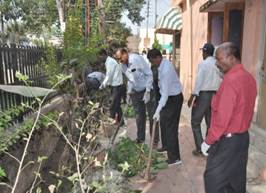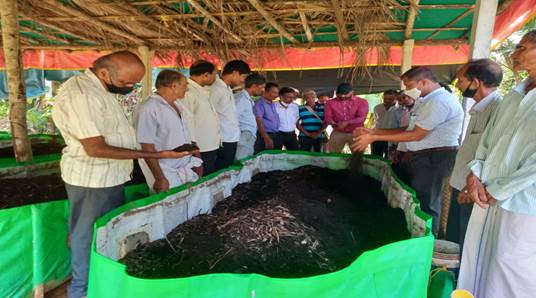Special Campaign 3.0 of Department of Agricultural Research and Education during 2nd – 31st October, 2023
Drawing inspiration from Prime Minister Shri Narendra Modi’s vision and mission to institutionalize Swachhata and minimize pendency in Government, Department of Agricultural Research and Education (DARE) and its subordinate organisations viz. Indian Council of Agricultural Research (ICAR) including Krishi Vigyan Kendras (KVKs) and its regional offices; Agricultural Scientists Recruitment Board (ASRB) and three Central Agricultural Universities (CAUs) and their colleges have actively participated in the Special Campaign 3.0.


Before After
This Department had set the target of reviewing 19843 physical files, 4717 E-files and conducting a Special Campaign on Swachhata on 3326 sites/locations.
The Department has achieved its targets as set above, by reviewing 24683 physical files and 5561 E-files. Also, the Swachhata Campaign was conducted on more than 150% of the targeted sites i.e. on 4987 sites/locations. Further, around 4,03,996 square feet of space has been freed and revenue of Rs. 40,73,586/- has been generated by scrap disposal of around 275 tonnes.
During the Special Campaign 3.0, the following best practices were also taken up:-
- Successful crop residue management in KVKs, ICAR
In the north-western region of India, managing crop residues poses a significant challenge, particularly with the time constraints for sowing the next crop. Farmers often resort to burning paddy residue due to this tight window. However, 65 KVKs in Punjab, Haryana, and Uttar Pradesh are actively engaged in campaigns against residue burning. Through a variety of information, education, and communication (IEC) activities, KVKs are striving to raise awareness about the adverse effects of burning crop residues. These KVKs are not only disseminating knowledge but also providing alternative technological solutions to farmers for effective crop residue management, specifically targeting paddy residue. KVKs are playing a pivotal role in educating stakeholders by organizing several training programs, equipping them with sustainable residue management practices. Additionally, they are conducting on-field demonstrations at strategic locations to showcase practical applications of these techniques. This proactive approach aims to shift farmers towards environmentally friendly practices.




- Vermicomposting for sustainable agriculture in KVKs, ICAR
More than 357 KVKs in India are actively organizing training programs to educate farmers about vermicompost making. This empowers farmers to convert organic waste into a valuable resource, presenting a practical solution for effective waste management. Beyond waste reduction, the process enhances soil fertility and boosts crop productivity, contributing significantly to sustainable agriculture practices. In addition to training programmes, KVKs are conducting on-field demonstrations, showcasing the vermicomposting process to farmers. As part of this effort, earthworms are provided to farmers, enabling them to engage in the production of high-quality vermicompost. This hands-on approach not only imparts practical knowledge but also encourages the adoption of environmentally friendly practices in agriculture. KVKs are playing a crucial role in promoting sustainable farming practices through vermicomposting across India.

The outreach of all the activities taken up during the campaign was duly extended through the Social Media Platforms. All the officials in the Department have taken up the campaign with full zeal & enthusiasm.

